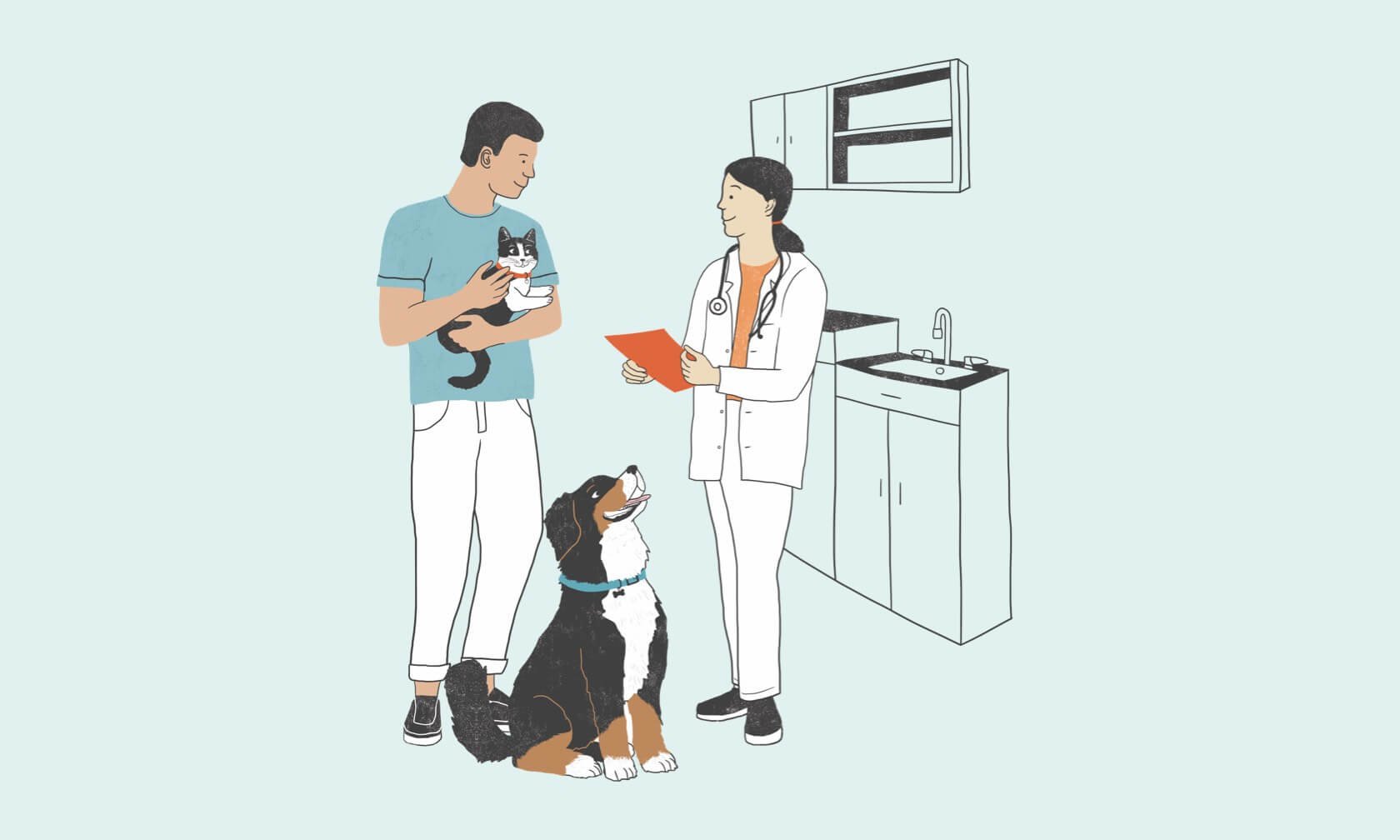Accidents in the house, asking to go out frequently or in the middle of the night, drinking more water, or simply acting out-of-sorts can all be indications that your dog may have a bladder infection (most commonly referred to by veterinarians as a urinary tract infection or UTI).
Figuring out if your dog has a bladder infection is important for their overall comfort, but also helps prevent infections from becoming a recurring issue and resistant to treatment.

Common Causes of Bladder Infections in Dogs
Bladder infections are somewhat common — affecting up to 27% of dogs[1] — and have many potential causes. Typically, they’re a result of bacteria traveling up the urethra and into the bladder. Dogs can pick up bacteria from the environment, swimming, or even spread from their own rectal or genital areas.
Some medical conditions and abnormalities that can predispose dogs to bladder infections include:
- Endocrine diseases like diabetes and Cushing’s disease
- Body abnormalities like a recessed vulva or vaginal stricture, allowing urine to pool or accumulate improperly
- Bladder tumors or obstructions
- Secondary to drugs that affect the immune system like steroids and chemotherapy
- Kidney or prostate disease
Symptoms of Bladder Infections in Dogs
It’s often obvious that something is going on when a housebroken, well-trained dog suddenly has an accident in the middle of the kitchen floor. On the other hand, it can be difficult to tell if dogs are urinating more frequently or simply exhibiting marking behavior.
Some infections will cause less subtle signs, so it's important to regularly monitor your pet's urination and water intake. Dog owners commonly notice:
- Urinary accidents
- Increased urination
- Blood-tinged urine
- Straining to urinate, squatting, or lifting their leg multiple times with little to no urine coming out
Because there are many different causes of bladder infections, it's important to address not only the infection but identify its cause to prevent future infections and get a faster and hopefully permanent resolution.
How Bladder Infections Are Diagnosed in Dogs
While bladder infection clinical signs are often quite straightforward, the underlying causes and treatments can be much more complicated. If your pet is exhibiting clinical signs of a bladder infection, it's time to talk to your veterinarian. Be prepared to discuss your dog’s diet, drinking habits, and clinical signs you’re seeing.
Depending on when your dog last had an exam and the specific nature of their symptoms, your veterinary office may either recommend that you bring in your pet for an examination and some laboratory work, or at a very minimum bring in a urine sample for testing.
On physical examination, your veterinarian will check your dog from tip to tail to ensure there are no other issues going on. They’ll be able to feel your dog’s bladder, assess your dog’s overall hydration, and check for body conformational issues that could have led to the infection.
If you didn’t bring in a urine sample, then they’ll grab one — either a free catch sample (so make sure your dog doesn’t pee a couple of hours before the exam) or via urinary catheter or cystocentesis (where a very small needle is used to obtain a sterile sample directly from your dog’s bladder).
Testing is the next step in the diagnosis process. Your veterinarian is going to run a combination of tests on the urine. A urine sediment is one of the components of the complete urinalysis and it will be examined under a microscope.
These tests and assessments can often be run in the veterinary hospital, with results typically back during the time of the visit. They allow your veterinarian to assess:
- If there is bacteria present, including shape and morphology
- If your dog is concentrating their urine appropriately
- If there is evidence of urinary crystals
- If there is blood (indicative of inflammation) or glucose (indicative of diabetes) and other chemical analytes such as protein in the urine
- On rare occasions, the presence of bladder parasites
Treating Bladder Infections in Dogs
For common, uncomplicated urinary tract infections, your veterinarian will prescribe an antibiotic specific to the type of bacteria identified on your pet’s urinalysis, and of course, their individual health history. Some cases may also require an anti-inflammatory to reduce inflammation in the bladder and provide some pain relief.
If a more complex cause for the infection is suspected, your veterinarian may recommend additional diagnostic testing. Depending on the results, antibiotics may be prescribed, but treatments including bladder stone removal, special diets to dissolve and prevent stones and crystals, supplements, and changes to your pet's water intake may be recommended.
Every pet’s course of treatment is unique — your veterinarian will work with you to create a treatment plan that is best tolerated by your dog, based on their specific urinalysis results, their medical history, diet, and lifestyle.
Preventing Future Infections
For first-time bladder infections, generally no ongoing therapy is needed after resolution of the infection. However, chronic bladder infections in dogs may be reduced by altering their diet or using special prescription diets to regulate the urine's mineral and pH content. Your veterinarian may recommend additional supplements or treatments as well.
Bladder infections can be painful, uncomfortable, and create unwanted messes and restless nights for dogs and their owners. Prompt diagnosis and treatment can eliminate the need for more tests, medication, cleanup, and best of all, less discomfort for your pup.
ZPC-00937R1
- "Canine bacteruria - KivistÖ - 1977 - Journal of Small Animal Practice" https://onlinelibrary.wiley.com/doi/abs/10.1111/j.1748-5827.1977.tb05843.x. Accessed 15 Sep. 2020.



